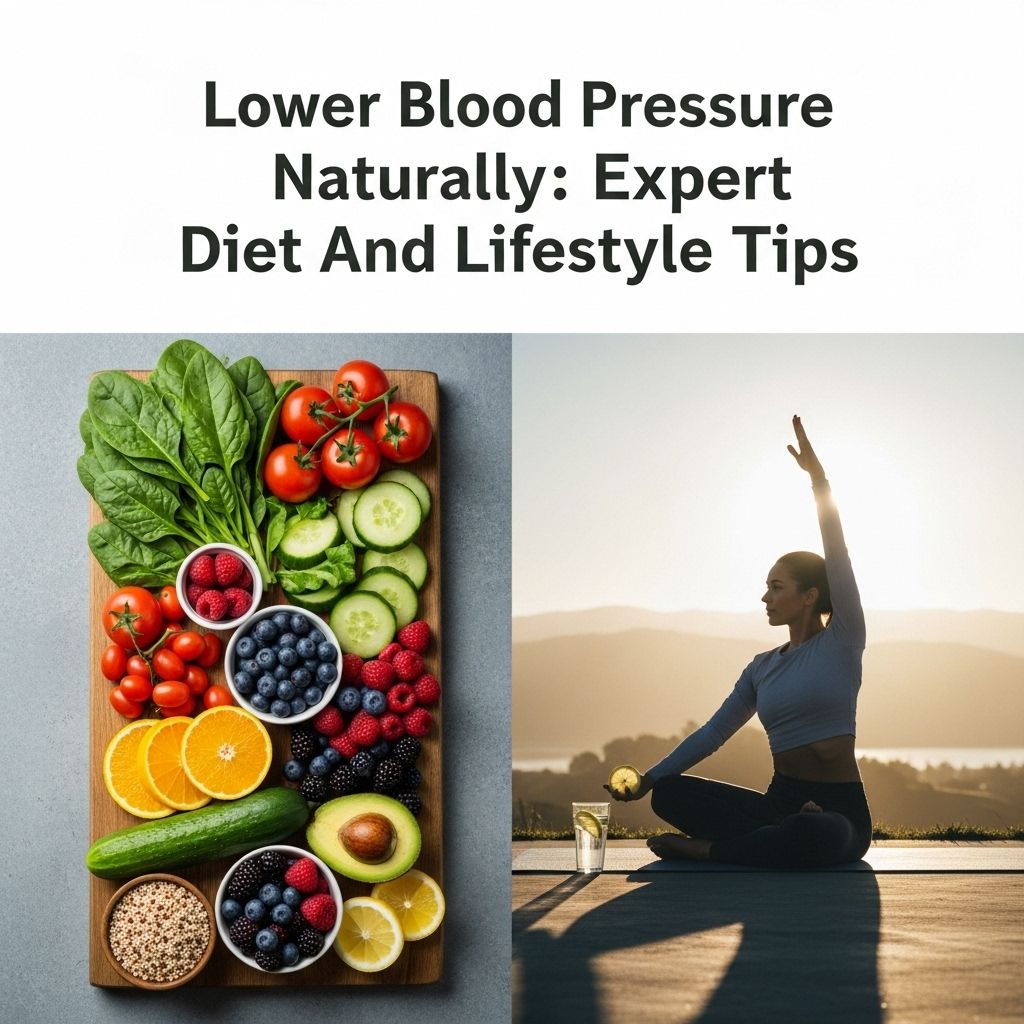Lowering Blood Pressure Naturally: A Comprehensive Guide
Plant-powered foods, simple workouts, plus stress relief offer healthier heart function.

Introduction to Lowering Blood Pressure Naturally
Managing high blood pressure, or hypertension, is crucial for maintaining overall health. Hypertension can lead to serious health issues such as heart disease, stroke, and kidney disease if not managed properly. While medication is often prescribed, there are numerous natural ways to help lower blood pressure. This article explores these methods, including dietary changes, exercise, stress management, and lifestyle adjustments.
Dietary Changes to Lower Blood Pressure
A balanced diet rich in fruits, vegetables, whole grains, and lean proteins is essential for lowering blood pressure naturally. Specific foods and nutrients can help regulate blood pressure:
- Unsweetened Yogurt: High in calcium, potassium, and magnesium, which are beneficial for blood pressure regulation.
- Berries: Rich in anthocyanins, which have been linked to reduced blood pressure in individuals with hypertension.
- Beets: High in nitrates, which convert to nitric oxide and help relax blood vessels.
- Sweet Potatoes: Loaded with magnesium, potassium, and fiber, making them a great side dish for managing hypertension.
- Leafy Greens: Contain potassium and magnesium, which help lower blood pressure.
Herbs and Spices for Blood Pressure Management
Certain herbs and spices have been identified as beneficial for lowering blood pressure:
- Garlic: Contains allicin, which has been shown to reduce systolic and diastolic blood pressure by relaxing blood vessels.
- Basil: While more research is needed, basil may help reduce blood pressure due to its potent compounds.
- Parsley: Rich in carotenoids and vitamin C, which can aid in blood pressure reduction.
- Thyme: Contains rosmarinic acid, which inhibits angiotensin-converting enzyme (ACE), helping to lower blood pressure.
- Ginger: Known for its anti-inflammatory properties and ability to relax blood vessels.
- Chinese Cat’s Claw: May help stimulate blood vessels to produce nitric oxide, aiding blood flow.
Physical Activity and Exercise
Regular exercise is a powerful tool for lowering blood pressure. Adults should aim for about 150 minutes of moderate-intensity exercise per week. Activities such as biking, swimming, and brisk walking are excellent options. Additionally, increasing daily steps to between 8,200 and 11,200 can also contribute to blood pressure management.
Impact of Weight Loss
Even a small amount of weight loss can have a significant impact on blood pressure. Losing as little as 2.2 pounds (1 kilogram) can lead to a reduction in blood pressure. Combining exercise with a balanced diet is crucial for effective weight management.
Stress Management Techniques
High stress levels can temporarily increase blood pressure. Practicing stress-reduction techniques such as meditation, yoga, or deep breathing exercises can help manage stress and support blood pressure regulation.
Frequently Asked Questions (FAQs)
Q: How quickly can I expect to see results from natural methods?
A: Results can vary, but consistent changes in diet and exercise often show noticeable improvements within a few weeks to months.
Q: Are there any specific risks associated with using herbal remedies?
A: Yes, herbal remedies can interact with medications or worsen certain health conditions. Always consult with a healthcare provider before starting any new supplements.
Q: What role does potassium play in lowering blood pressure?
A: Potassium helps balance sodium in the body and can lower blood pressure by promoting healthy blood vessel function. Foods rich in potassium include bananas, avocados, and leafy greens.
Q: Can I completely replace medication with natural methods?
A: While natural methods can significantly help manage blood pressure, it is crucial to consult with a healthcare provider before making any changes to your medication regimen. Natural methods are often used in conjunction with, not in place of, prescribed medications.
Summary and Conclusion
Lowering blood pressure naturally involves a combination of dietary changes, regular exercise, stress management, and lifestyle adjustments. By incorporating these methods into your daily routine and consulting with healthcare professionals, you can effectively manage hypertension and improve overall health.
References
- https://www.healthline.com/nutrition/herbs-to-lower-blood-pressure
- https://www.ncoa.org/article/10-foods-that-help-lower-blood-pressure-naturally/
- https://www.unitypoint.org/news-and-articles/high-blood-pressure-triggers-to-avoid
- https://www.nm.org/healthbeat/healthy-tips/foods-that-can-lower-your-blood-pressure-naturally
- https://www.youtube.com/watch?v=xmi9qghwQEY
- https://pmc.ncbi.nlm.nih.gov/articles/PMC8109646/
- https://www.novanthealth.org/healthy-headlines/5-all-natural-strategies-that-may-help-control-high-blood-pressure
- https://www.medicalnewstoday.com/articles/318716
Read full bio of Sneha Tete












